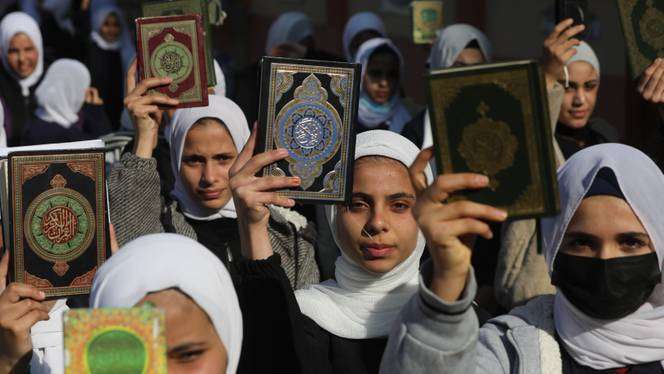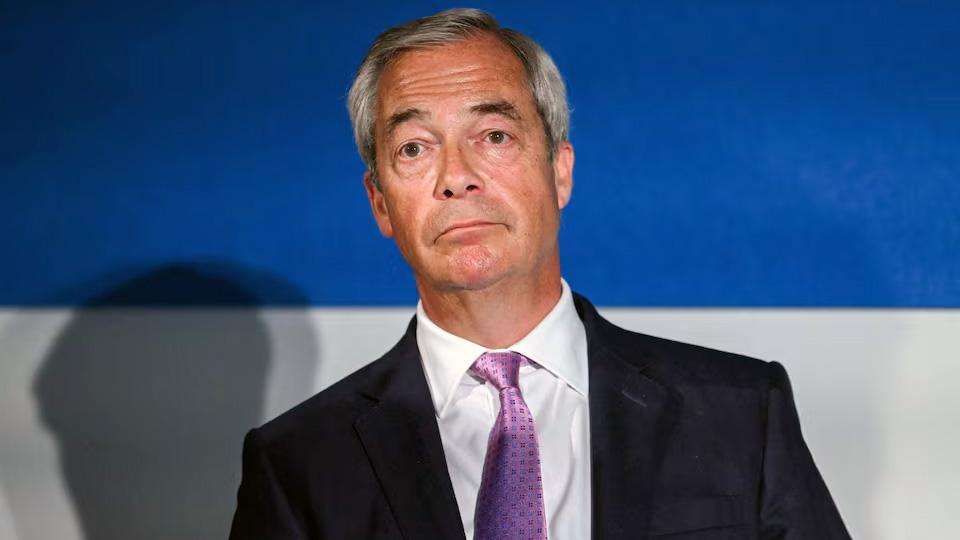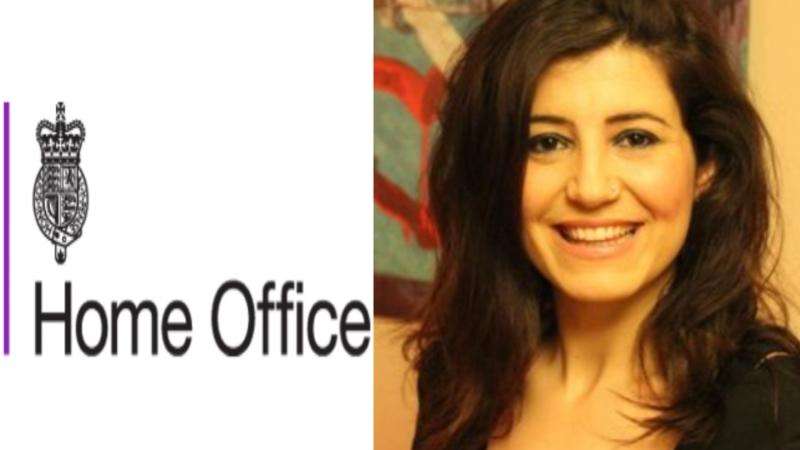 People stage a protest against the burning of the Quran in Sweden in front of Swedish Embassy in Khan Younis, Gaza on January 24, 2023./ Photo: AA Archive[/caption]
We are no strangers to the desecration of the Quran in Sweden and other parts of Europe. The history of book burnings in Europe dates back to the Middle Ages, when these acts held significant symbolism, extending far beyond mere written words.
According to Dr Farid Hafez, a senior research fellow at the Bridge Initiative at Georgetown University, book burnings take on a role of symbolic persecution when the targeted people are absent or deceased, with their representations destroyed.
“For me, book burning is a symbolic murder or symbolic destruction if the people these books symbolise cannot be eliminated,” he says.
Dr Hafez also cites German Jewish author Heinrich Heine's famous words, 'Those who burn books will ultimately burn people,' in reference to the historical context of the Spanish Inquisition.
During the Spanish Inquisition in the 1500s, Cardinal Ximenez de Cisneros ordered the public burning of all the Arabic books they could find in Granada. Except for the ones about medicine, the records suggest there were around 5,000 books that were put alight, according to various sources.
Experts say the recent incidents of Quran burning should be viewed in a historical context since such actions in the past have led to large-scale violence against minorities and weaker sections in society.
People stage a protest against the burning of the Quran in Sweden in front of Swedish Embassy in Khan Younis, Gaza on January 24, 2023./ Photo: AA Archive[/caption]
We are no strangers to the desecration of the Quran in Sweden and other parts of Europe. The history of book burnings in Europe dates back to the Middle Ages, when these acts held significant symbolism, extending far beyond mere written words.
According to Dr Farid Hafez, a senior research fellow at the Bridge Initiative at Georgetown University, book burnings take on a role of symbolic persecution when the targeted people are absent or deceased, with their representations destroyed.
“For me, book burning is a symbolic murder or symbolic destruction if the people these books symbolise cannot be eliminated,” he says.
Dr Hafez also cites German Jewish author Heinrich Heine's famous words, 'Those who burn books will ultimately burn people,' in reference to the historical context of the Spanish Inquisition.
During the Spanish Inquisition in the 1500s, Cardinal Ximenez de Cisneros ordered the public burning of all the Arabic books they could find in Granada. Except for the ones about medicine, the records suggest there were around 5,000 books that were put alight, according to various sources.
Experts say the recent incidents of Quran burning should be viewed in a historical context since such actions in the past have led to large-scale violence against minorities and weaker sections in society.
History of book-burnings in Europe
“Burning holy books like the Quran - or the Torah for that matter- is a hate crime,” says Lena Posner-Korosi in an interview, the head of the Jewish community in Sweden.
It was a grim reminder for her community because that made them recall the Nazi policy of burning banned books of Jewish authors, which was a prelude to the Holocaust.
Starting from May 10, 1933, student groups under Nazi influence conducted public bonfires where they burned books they deemed "not German." These burnings happened in 34 towns and cities with universities. The books of well-known Jewish, liberal, and leftist authors were tossed into the fires.
Consequently, many members of Jewish communities in Sweden and Denmark are now urging the authorities to take a tougher approach in response to these troubling events. “History has taught Jews what can come next when you start burning books,” Posner-Korosi adds.
She is calling for the existing legislation on hate crimes to be amended so that the burning of sacred texts is recognised as an illegal act.
Rashid Musa, former chairman of the Muslim Swedish Youth Organization, also thinks the historical context of the latest events also needs to be taken into account.
"The Swedish authorities are using free speech as an argument to allow him (Paludan) to burn the Quran, but we have to understand and also put this into historical context," said Musa in an interview with Anadolu Agency.
"We don't have to go that far into history as we can look at Bosnia in the mid-1990s, where Serbian fascists used to burn Bosnian literature and bomb libraries," he added.
In August 1992, a devastating incident occurred in the Bosnian capital of Sarajevo, where nearly 2 million books were deliberately set on fire. This tragic event resulted in the destruction of Ottoman-era manuscripts and delicate 500-year-old brochures as the National Library of Bosnia and Herzegovina fell victim to shelling and burning by Serb forces.
Two of these devastating genocides have demonstrated a troubling pattern where book-burning incidents mark the beginning of a domino effect, leading to systemic violence against a particular group of people.
If left unchecked, experts urge that the consequences of such violent acts will escalate, posing a significant threat to the lives of countless Muslim individuals residing in Europe and beyond.
‘Mainstreaming’ Hate Crimes
The dark shadow of Europe’s violent history persists even today, with the rise of far-right ideologies propagating fascist worldviews fast penetrating into the continent’s political sphere. This phenomenon has contributed to an unsettling increase in hate crimes across the continent.
Far-right parties that were once on the margins of the political spectrum, are now attaining governmental positions alongside mainstream right-wing counterparts and this trend is being seen in various countries.
The normalisation of hate speech by far-right parties towards specific groups of people through their political discourse is increasingly manifest in everyday life across Europe.
This trend was reported by the European Commission’s 2021 communication titled "A more inclusive and protective Europe: extending the list of EU crimes to hate speech and hate crime," which highlights a significant surge in hate speech and hate crime incidents across Europe in recent years.
“Hate is moving into the mainstream, targeting individuals and groups of people sharing or perceived as sharing a common characteristic, such as race, ethnicity, language and religion,” says the Commission’s paper.
The more prominent political figures focus on targeting particular groups within the mainstream, the more society tends to normalise hate speech and hate crime against minority communities.
The incidents of Quran-burning, which have been popularised once again by a Danish far-right party leader, serve as stark examples of this disturbing trend of normalising hostility.
Such incidents have been witnessed repeatedly, both within Europe, and various parts of the world, highlighting the growing acceptance of animosity towards Muslims.
Quran Burnings: From the US to Europe
Back in 2005, in Guantanamo Bay detention camp where hundreds of Muslim men were held without a charge or trial due to the US’s controversial Global War on Terror policy initiated after the 9/11 incidents, a report published in Newsweek exposed that US personnel had deliberately damaged a copy of the book by flushing it in a toilet in order to torment the prison’s Muslim captives.
5 years later in 2010, on the 9th anniversary of 9/11, an evangelical pastor Terry Jones announced that he would burn 200 copies of the Quran. His church also planned to host an ‘International Burn a Quran Day’, but later on it had to cancel the event due to intense protests.
Despite the cancellation of his previous plans, Jones remained undeterred and attempted another large-scale burning event on September 11, 2013. However, he was arrested before he could set fire to 2,998 copies of the Quran, symbolising one for each victim of the 2001 attacks. Jones faced charges related to illegally transporting fuel and openly carrying a firearm.
European politicians, inspired by such actions, engaged in systemic insults against the Quran and Muslims. In 2017, Geert Wilders, a far-right Dutch politician, even pledged to ban the Quran in the Netherlands, drawing comparisons to the banning of Adolf Hitler's infamous book, 'Mein Kampf.'
In recent years, Rasmus Paludan, a Danish-Swedish provocateur, has popularised Quran burning once again. His actions have inspired others seeking international notoriety to follow in his footsteps. Embracing this controversial strategy, Paludan drew inspiration from figures like Wilders, propelling himself into the global spotlight.
Freedom of speech or hate crime?
Debates revolving around the Quran burnings in Europe mostly seem to prioritise protecting free speech over addressing the racist dimensions of Quran burnings. This focus may hinder the increasing mainstream acceptability of anti-Muslim attitudes.
When asked if legislative amendments are crucial to classify Quran burnings as hate crimes to ensure the safety and rights of Muslim communities in Europe, Dr Hafez underscores a larger, underlying concern.
“If the Quran-burning is a symbolic murder, specifically of people allying themselves with a white privileged group, then the real question is how can we live in a world, where Muslims as the marginalised people in countries like Sweden can become equals in these societies. That’s the bigger question for me.”
He sheds light on the deep-seated Islamophobia entrenched in European countries, highlighting multifaceted challenges faced by Muslims face:
“Muslim educational institutions are put under state pressure, associations such as Sweden's Young Muslims are defunded, Muslim civil society organisations are stripped of their rights to run educational institutions etc.,”
“This is what has to be addressed by the international community. If we leave the battle to the symbolic struggles, as important as they might be, we are ignoring the real problems.”







.svg)
